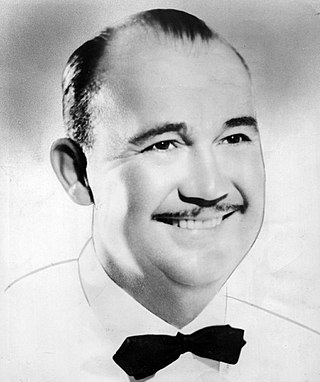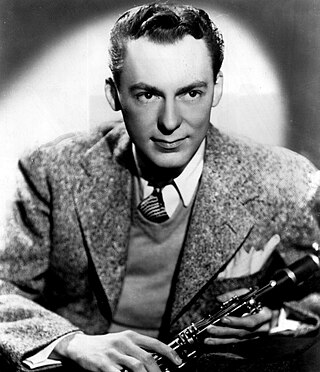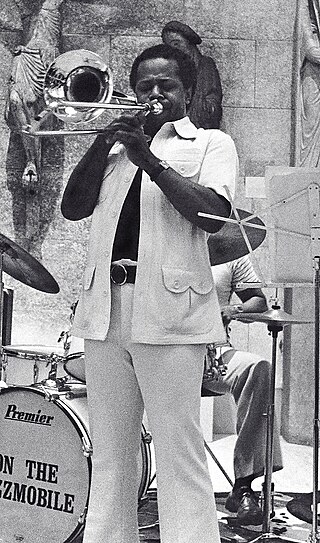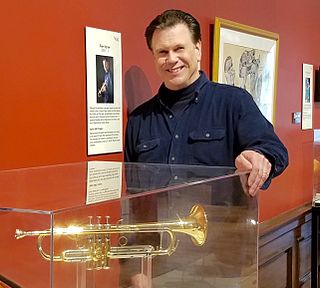Related Research Articles

The Original Dixieland Jass Band (ODJB) was a Dixieland jazz band that made the first jazz recordings in early 1917. Their "Livery Stable Blues" became the first jazz record ever issued. The group composed and recorded many jazz standards, the most famous being "Tiger Rag". In late 1917, the spelling of the band's name was changed to Original Dixieland Jazz Band.

Paul Samuel Whiteman was an American bandleader, composer, orchestral director, and violinist.

Neal Paul Hefti was an American jazz trumpeter, composer, and arranger. He wrote music for The Odd Couple movie and TV series and for the Batman TV series.

Woodrow Charles Herman was an American jazz clarinetist, saxophonist, singer, and big band leader. Leading groups called "The Herd", Herman came to prominence in the late 1930s and was active until his death in 1987. His bands often played music that was cutting edge and experimental; their recordings received numerous Grammy nominations.

Locksley Wellington Hampton was an American jazz trombonist, composer and arranger. As his nickname implies, Hampton's main instrument was slide trombone, but he also occasionally played tuba and flugelhorn.

"Frenesí" is a musical piece originally composed by Alberto Domínguez Borrás for the marimba, and adapted as a jazz standard by Leonard Whitcup and others.

Willis Leonard Holman, known professionally as Bill Holman, is an American composer, arranger, conductor, saxophonist, and songwriter working in jazz and traditional pop. His career is over seven decades long, having started with the Charlie Barnet orchestra in 1950.

Roger O'Neal Ingram is a jazz trumpeter, educator, author, and instrument designer. He played trumpet for the orchestras of Maynard Ferguson, Woody Herman, Wynton Marsalis, Ray Charles, and Harry Connick Jr.
"Beautiful Love" is a popular song composed by Wayne King, Victor Young and Egbert Van Alstyne with lyrics by Haven Gillespie. It was introduced by the Wayne King Orchestra in 1931. The song has been called the "second favourite number" of King, after the Orchestra's theme song "The Waltz You Saved for Me".
"Twisting at the Woodchopper's Ball" was the first made in Canada single to top the International Charts.

"Every Day I Have the Blues" is a blues song that has been performed in a variety of styles. An early version of the song is attributed to Pinetop Sparks and his brother Milton. It was first performed in the taverns of St. Louis by the Sparks brothers and was recorded July 28, 1935 by Pinetop with Henry Townsend on guitar. The song is a twelve-bar blues that features Pinetop's piano and falsetto vocal. The opening verse includes the line "Every day, every day I have the blues".

This is a timeline documenting events of Jazz in the year 1959.

Swing jazz emerged as a dominant form in American music, in which some virtuoso soloists became as famous as the band leaders. Key figures in developing the "big" jazz band included bandleaders and arrangers Count Basie, Cab Calloway, Jimmy and Tommy Dorsey, Duke Ellington, Benny Goodman, Fletcher Henderson, Earl Hines, Glenn Miller, and Artie Shaw. Duke Ellington and his band members composed numerous swing era hits that have become standards: "It Don't Mean a Thing " (1932), "Sophisticated Lady" (1933) and "Caravan" (1936), among others. Other influential bandleaders of this period were Benny Goodman and Count Basie.

The period from the end of the First World War until the start of the Depression in 1929 is known as the "Jazz Age". Jazz had become popular music in America, although older generations considered the music immoral and threatening to cultural values. Dances such as the Charleston and the Black Bottom were very popular during the period, and jazz bands typically consisted of seven to twelve musicians. Important orchestras in New York were led by Fletcher Henderson, Paul Whiteman and Duke Ellington. Many New Orleans jazzmen had moved to Chicago during the late 1910s in search of employment; among others, the New Orleans Rhythm Kings, King Oliver's Creole Jazz Band and Jelly Roll Morton recorded in the city. However, Chicago's importance as a center of jazz music started to diminish toward the end of the 1920s in favor of New York.

John Frank Oddo was an American jazz pianist, composer, and arranger. He is most notably associated as pianist and musical director for Woody Herman, Rosemary Clooney and Michael Feinstein.
References
- ↑ Woody Herman biography at AllMusic - retrieved on 25 May 2009
- ↑ William Emmett Studwell and Mark Baldin: The Big Band Reader: Songs Favored by Swing Era Orchestras and Other Popular Ensembles. Haworth Press, 2000. ISBN 0-7890-0914-5. p. 158
- ↑ The Real Book, Volume I, sixth edition. Hal Leonard. ISBN 0-634-06038-4. p. 447
- ↑ Grammy Hall of Fame Awards at Grammy.com - retrieved on 25 May 2009